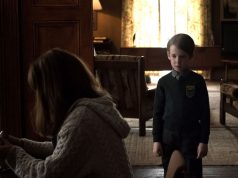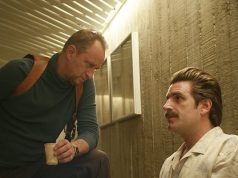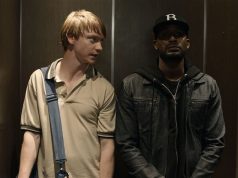Jean-Luc Godard’s influence on modern cinema is beyond dispute. Even if you haven’t seen his films that were part of the French New Wave movement of the 1960s, you’ve seen homages to them, both intentional and subconscious, in the works of Quentin Tarantino and other avant-garde directors.
Godard, now 74, has been making films non-stop for 45 years, and “Notre Musique” shows he has not lost his flair for experimentation — that, or he’s simply made so many movies that “normal” bores him. Nonetheless, being a pioneer doesn’t give you a free pass. “Notre Musique” is an impenetrably ponderous, smarty-pants rumination on war (among other things), the very sort of film for which the term “artsy-fartsy” was devised. The only people I can imagine enjoying it are hard-core Godardites who have convinced themselves that they love everything he does.
The film is divided into three chapters, called “kingdoms”: hell, purgatory and paradise. The first is nothing more than several minutes of war footage, some real and some from movies, with discordant piano tinkling serving as punctuation. “Purgatory” and “paradise” are a little more straightforward, at least insofar as they have characters and a bit of a story, showing a literary conference in Sarajevo at which various people (including Godard himself, as himself) wax deep on matters of war, racism, death, the Israeli-Palestinian conflict, and so forth. Occasionally, some American Indians wander into the picture to speak in measured tones about the injustices they’ve suffered at the hands of the White Man.
Godard enjoys commenting on cinema itself almost as much as he enjoys commenting on humanity, and some of what he does here is interesting to me as a film buff: the observations on Howard Hawks’ work (“His Girl Friday”), the interpolation of movie clips with news footage, the fact that the whole thing is structured in so unapologetically obscure a fashion.
But in general, it is TOO obscure to be anything less than a lot of work for a person to sit through. Slogging through the references, philosophies and questions that comprise the film may be possible, but to what end? Even once you’ve sorted through it, I don’t know how much sense it will make.
C- (1 hr., 16 min.; French with subtitles; )





